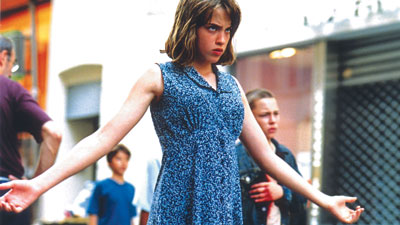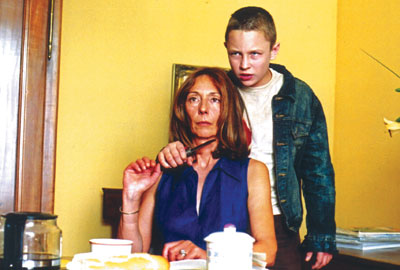THE SILENT TREATMENT
By Travis Crawford
 |
| Adèle Haenel and Vincent Rottiers in Les Diables. |
While Toronto festgoers flocked to the shallow shock tactics of Irréversible and the Miramax-friendly Gallic froth of Jet Lag, the festival’s best French film, Les Diables (The Devils), screened on the opening day in the Discovery program and was sadly forgotten by the end of the event.
Director Christophe Ruggia’s intense and emotional drama follows the adolescent Joseph as he attempts to care for his mute, autistic sister, Chloé, the two siblings estranged from their mother and on the run from various child care facilities. One typically expects such subject matter to be treated with glum, austere naturalism, but Ruggia’s film excels by embracing a feverish hyperrealism that mirrors the perceptions of his two young protagonists. "I wanted to show the raw energy of the troubled times any teenager goes through," comments Ruggia. "I tried to search deep into the hearts of these too-soon-to-be-adults – to experience with them, from the inside, the burning emotions of their heart and the chaotic journey of their body. The film shifts between two worlds: the ‘real’ one, where Joseph and Chloé meet the adults – a brutal world with no communication – and the ‘other’ world, which is the [adult] world seen by children/teenagers. And that [second] world is what Les Diables is all about, and what makes a tale, or fable, out of the film."
Les Diables avoids the pedestrian rhythms of other sagas of psychological disability by refusing to specifically identify Chloé’s condition as autism. "I did not want to put a name on it, because I was talking about a larger problem with children – solitude and loneliness," elaborates Ruggia, who based the film upon his own adolescence, along with the experiences of two friends he met while working at a youth home. Nevertheless, Ruggia researched autism for two years prior to filming Les Diables, and, while non-scientific in its approach to the illness, the film has received encouraging feedback from autistic children and their families. "The movie was shown to autistic people who were assumed to be completely mentally ‘closed off,’ and in fact, a lot of them then started writing about the movie, including a 22-year-old who they had assumed was incapable of doing anything," Ruggia says. "And the movie is now being supported by the French Federation of Autistic Children."
 |
| Aurélia Petit and Vincent Rottiers in Les Diables. |
The ferocity of Ruggia’s film is aided immensely by its extraordinary young actors, Adèle Haenel (Chloé) and Vincent Rottiers (Joseph), who contribute two of the most affecting performances given by children in recent memory. Neither had ever acted previously (Haenel was discovered when she tagged along with her brother to his casting session, and Rottiers was literally chased down on his bike in the streets by the film’s casting director), yet both deliver fearless portrayals. "I never work with children who have already acted before," explains Ruggia, who met with 500 kids to select 11 actors for his previous film, the 1997 debut Le Gone du Chaâba. "I work with children with a lot of problems. For example, Vincent lost his father at the same age as I did, so we felt a strong [bond]. I try to reconstruct the characters of these young people so that they can blossom and develop self-confidence and concentration. It’s a project of life for them, and it will change their lives forever. And while that experience interests me, I’m not preparing them to be ‘professional actors.’"
VOD CALENDAR


 See the VOD Calendar →
See the VOD Calendar →


